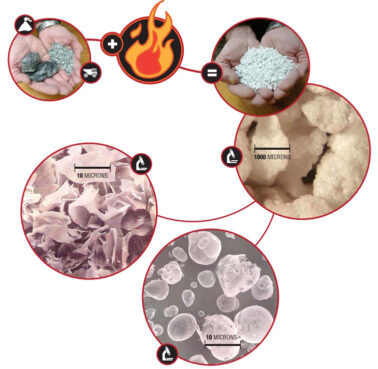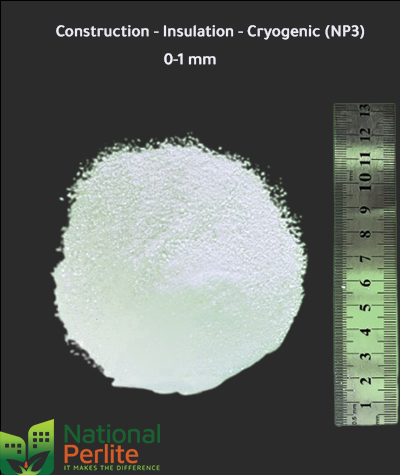

Cryogenics
Cryogenics involves the production and behavior of materials at very low temperatures, typically below -100 degrees Celsius. Our cryogenic perlite is engineered to provide unmatched insulation in cryogenic tanks, where maintaining the stability of liquid gases is critical. By filling the interstitial spaces between double-walled vessels, perlite maintains the necessary low temperatures to keep gases in their liquid state, even at extreme lows of -270 degrees Celsius.
Learn More
Cryogenic Perlite Applications
- Super-Cooled Gases: Ideal for maintaining cryogenic temperatures in containers during transport and storage of liquefied gases.
- Vessels and Storage Tanks: Perlite insulation ensures the integrity and efficiency of tanks storing cryogenic materials.
- LNG Facilities: Perlite is crucial in insulating LNG tanks and processing equipment, providing safety and energy efficiency.
- Pharmaceutical Storage: In pharmaceuticals, where precise temperature control is vital, perlite helps maintain the required cold chain conditions.
- Biological Specimen Storage: Perlite ensures optimal temperatures are sustained for the preservation of biological specimens.
- Air Separation Units: Utilize perlite’s superior insulation in units where atmospheric gases are cooled and separated.
- Cold Boxes: Protect sensitive cryogenic processes with perlite, which provides excellent thermal isolation in cold boxes.
- Refrigeration Plants: Perlite is a key component in the insulation systems of refrigeration plants, contributing to energy conservation and system effectiveness.
- Efficiency in LPG Facilities: Perlite is indispensable in LPG storage and processing facilities for its superior insulation properties, ensuring the liquified gas remains at the optimal low temperatures for safe storage and efficient transport.
Benefits of Perlite in Cryogenic
- Non-Settling Characteristics: Perlite insulation tends to maintain its original volume and insulating effectiveness over time, unlike some other materials that can settle or compact, leading to diminished performance.
- Low Moisture Retention: Perlite’s hydrophobic nature means it absorbs very little moisture, which is critical in cryogenic applications where the presence of moisture can significantly impact insulation effectiveness.
- Chemical Inertness: Perlite does not react with cryogenic fluids, ensuring that it does not degrade or off-gas, which could otherwise contaminate the stored substances.
- Ease of Installation and Reusability: Perlite can be easily installed in cryogenic systems, and when systems are de-commissioned or serviced, perlite can often be collected and reused.
- Cost-Efficiency: The use of perlite often results in cost savings due to its natural abundance, ease of installation, and low maintenance requirements.
- Environmental Safety: Perlite is a naturally occurring material that is mined and processed with minimal environmental impact, making it a safe choice for cryogenic applications.
- Compliance with Industry Standards: Perlite often meets the strict industry standards required for cryogenic insulation materials, ensuring reliability and safety in sensitive applications.
Technical Features
| Attribute | Values |
|---|---|
| Density | 45-50kg/m3 (-+%10) |
| Grain Diameter | 0-1 mm |
| Sieve Analysis | Max. % 10 + 1,18 mm Min. % 50 + 0,15 mm |
| Thermal Conductivity Coefficient | 0,030-0,040 Kcal/mh C |
| Chemical Composition | Alkaline Oxides Not effected from oxide and alkaline. |
| pH= 7 Fusion Temperature | 1200 C |
| Thermal Conductivity in Lower Temperature Value ( – 40 C °) | (0,035 – 0.039W / m ° K) |
| Thermal Conductivity cryogenic materials applications in average temperature value ( – 125 C ° ) | (0,025-0,029 W / m ° K) |
| Package | 0,1 m3 Packages |
Why Perlite Is Effective: A Scientific Perspective
Perlite’s effectiveness is rooted in its unique physical properties. When heated to approximately 900°C (1,700°F), perlite’s volcanic glass softens, and its internal water vaporizes, causing an expansion that transforms the rock into a lightweight, porous material.
Versatile Functionality:
- Insulation: The expanded form of perlite consists of micro-bubbles, creating an insulative material that traps air and reduces thermal conductivity. This feature makes it ideal for insulation in the construction industry.
- Filtration: These same micro-pores effectively filter out impurities, making perlite an excellent filtration aid for liquids in various sectors, from food and beverage to wastewater treatment.
- Horticulture: In gardening and agriculture, perlite’s air pockets retain water and provide space for air, promoting root growth and improving soil structure without compaction.
- Industrial Uses: Perlite is also incorporated into lightweight plasters, concrete, and refractory materials, improving strength while maintaining a lighter weight.
- Consumer Products: Its gentle abrasiveness and absorbency make perlite a useful component in personal care products like exfoliants and a carrier in cleaning supplies.


